I am a cactus lover and I like to have different types of cactus in my garden. Therefore I picked pink cactus this time when I went out to buy some cactus. So let me introduce some pink cacti here in this article. I am sure you will love to have it in your home.
Many cactus lovers tend to grow pink cacti as they are pleasing to watch. That said Many female succulent enthusiasts opt to go ahead with pink cactus as most of the female’s favorite color is pink. Growing a pink cactus is so much fun.
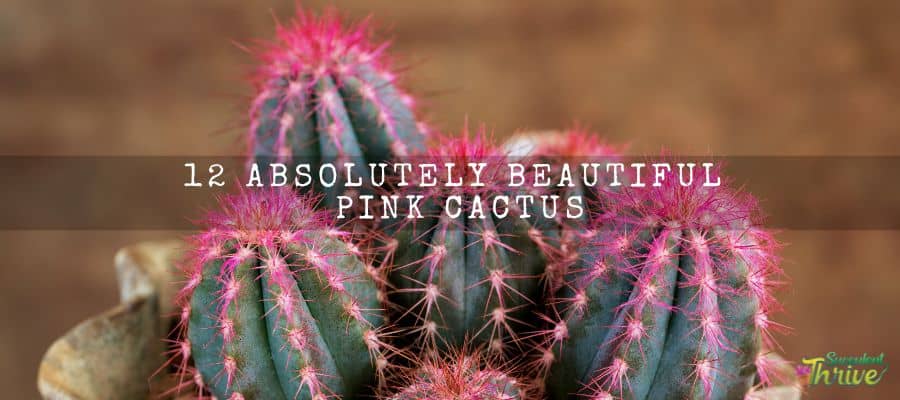
So, if you are thinking of growing a pink cactus without sticking to regular green colored succulents, you will enjoy reading this article. There are plenty of options to choose and all of them will add so much color and a texture to your garden.
Cacti in general require easy maintenance and pink cactus are no different to them. Cactus are quite famous among the gardeners due to their versatility and due to their hardiness.
Not only that but also, their low maintenance, unique look, and different shapes make them an extraordinary set of plants. Besides these features, their spectacular blooms make them look even prettier. So, let’s find out more about these pink cacti.
01. Echinocactus grusonii
Echinocactus grusonii are hailing from Mexico. They are also known as Golden barrel cactus in common. Echinocactus grusonii plants are an evergreen set of plants which would produce flowers in yellow. They will emerge with flowers in spring and in summer.
The cactus tends to take a globose shape at the initial stage. However, they grow taller as they mature. They would be about 90 cm in height and in width as well. Echinocactus grusonii produce one or two offsets when they are too young.
You could spot their stem in pale green color, and they consist of a number of ribs as well. Echinocactus grusonii normally have golden or yellow color spines. However there are varieties with pink spins.
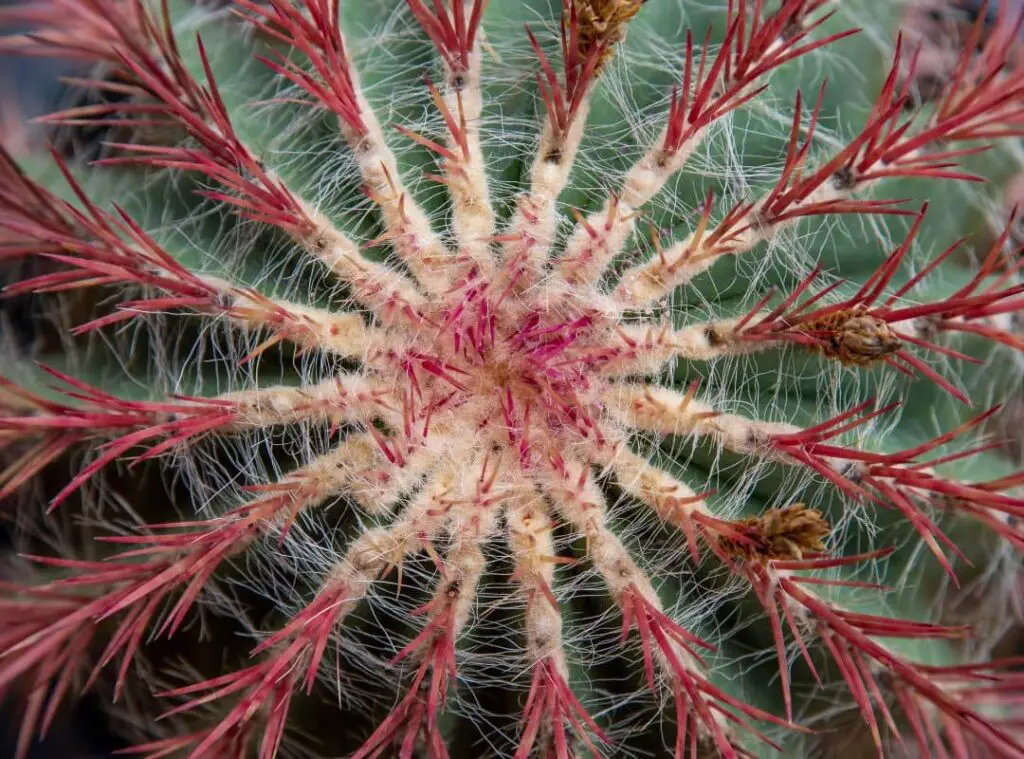
02. Mammillaria spinosissima (Spiny pincushion cactus)
Spiny pincushion cactus which is called as Mammillaria spinosissima scientifically is a beautiful blue green cactus. These plants are endemic to Central Mexico. Further they would be covered with red orange spines.
You could spot them bearing magenta flowers during the spring season. These cylindrical shaped cacti would get as tall as 30 cm ( 12 inch). Further they would be 10 cm ( 3.9 inches ) broad too.
Spiny pincushion cactus would carry spines in red brown or in white colors. Furthermore , Spiny pincushion cactus produce flowers in pink color. Besides, those flowers would tend to take a funnel shape as well. in addition to that they produce a red fruit item which would be club shaped.
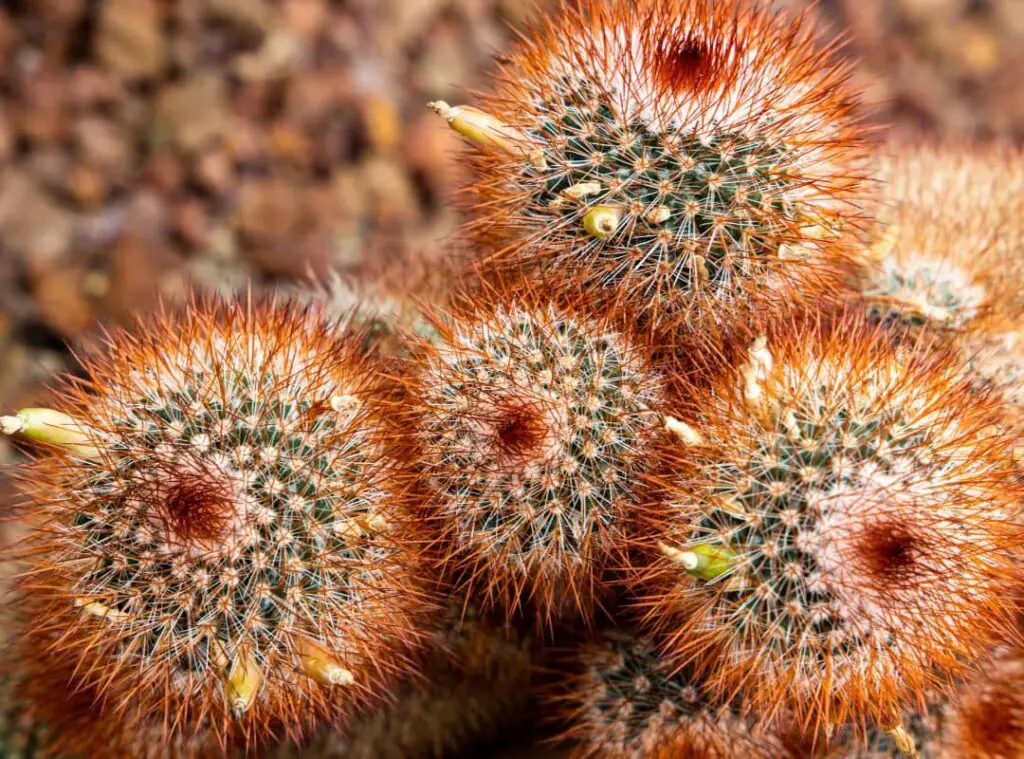
03. Echinocereus rigidissimus
Echinocereus rigidissimus plants are a low growing set of plants which would usually grow as solitary plants. These plants develop different colored spines every year. Thus, they have earned the common name called Rainbow cactus.
Echinocereus rigidissimus stem would be more short and cylindrical. They would be about 30 cm in height and 4-11 cm broad too. Echinocereus rigidissimus plants are native to Mexico.
Echinocereus rigidissimus consist of tuberculate ribs which would be either straight or undulate. They don’t come up with central spines usually. Besides these features, may form 16-22 stiff radial spines as well. In addition to these characteristics, you could witness these plants flowering in bright pink colors too.
Echinocereus rigidissimus blooms would be 6-7 cm long and 6-10cm wide too. You could spot them flowering in late spring and summer. Lastly, Echinocereus rigidissimus plants would develop fruits in globose shape, and they would be green dark purple colors.
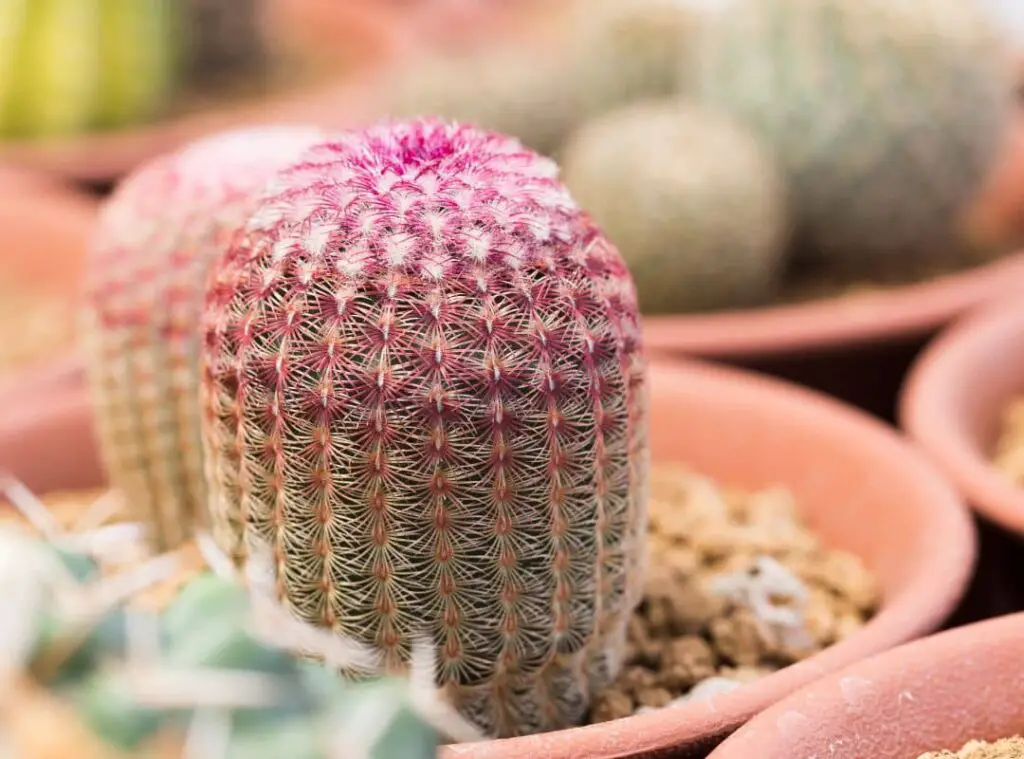
04. Ferocactus cylindraceus
Ferocactus cylindraceus are hailing from the United States. They are barrel shaped cactus types and would usually grow unbranched. There are about four subspecies of these plants too. if I briefly explain on the plant’s stem, you could spot them in green.
They would be spherical in shape and later on they would become columnar in shape. In terms of the sizes of the plants, they would grow up to 2m in height. Further they would be 30 cm in diameter as well.
You could spot them bearing one large central spine. Those spines would be light gray to red and yellow in color. However, they would turn black as they mature. In addition to these factors, Ferocactus cylindraceus plants may develop flowers in red.
Furthermore, those flowers may consist of yellow tinges as well. They would start to produce flowers in May and in June. Ferocactus cylindraceus would develop a fruit item in yellow or yellowish green.
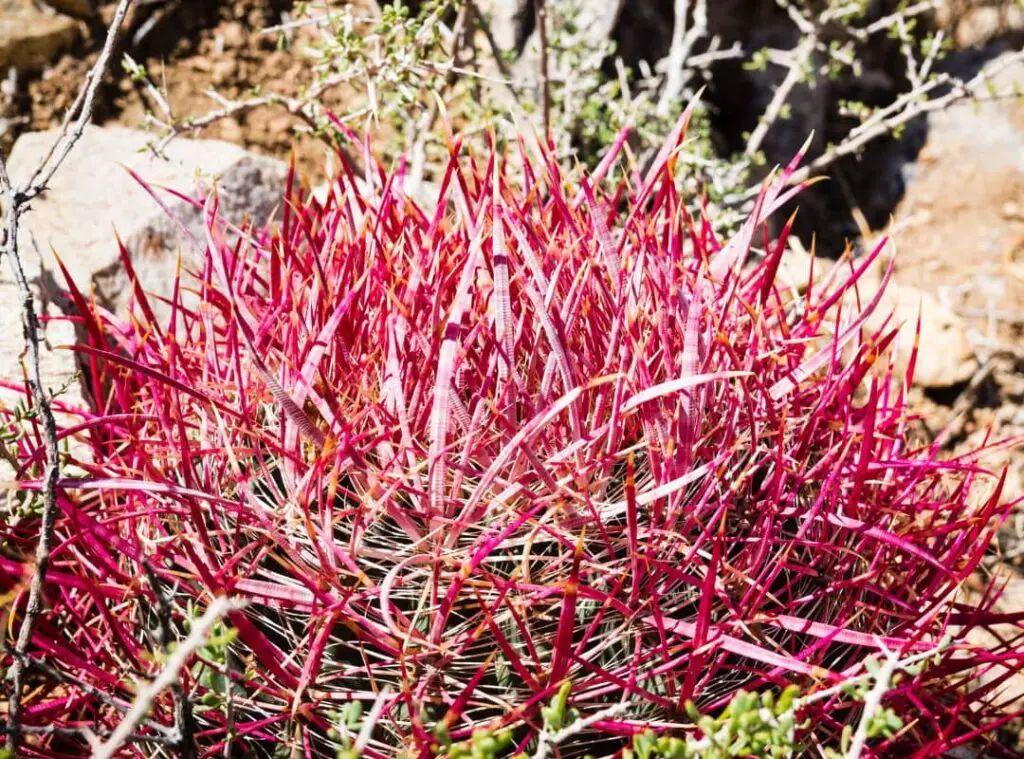
05. Ferocactus pilosus
Ferocactus pilosus plants are hailing from Mexico. They are clumps forming simple cacti which would produce red spines. In fact, their bodies would be deep green in color and that would be covered with red spines as well. The stem of the Ferocactus pilosus plants would tend to take a columnar shape. They would grow up to 2,4(-3) m tall and 30 to 40 cm in diameter.
Furthermore, Ferocactus pilosus plants may also consist of compressed ribs as well. in addition to that they would produce areolas which would tend to take a circular shape. Ferocactus pilosus plants emerge with flowers in yellow to red.
They would be 2,5 cm in length. Besides they would tend to take an orbicular shape too. Last but not least, you could spot Ferocactus pilosus plants producing a yellow fruit item as well.
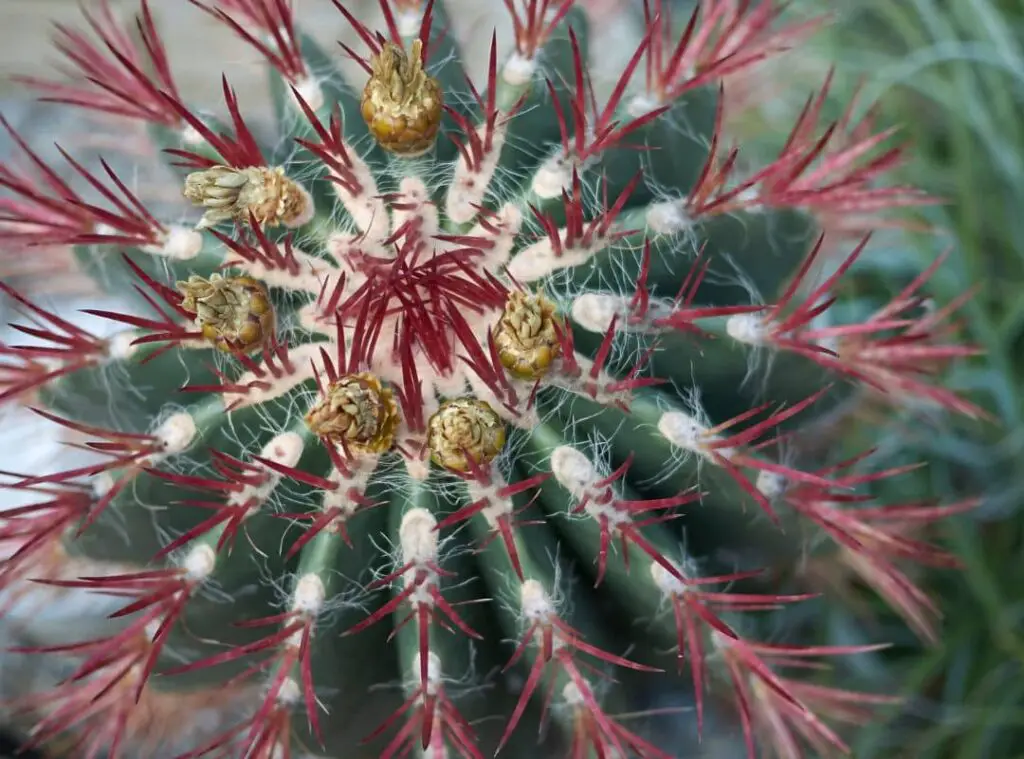
06. Ferocactus latispinus
Ferocactus latispinus plants are endemic to central Mexico. If I briefly explain the plants, they would be modest sized barrel cactus. Further they have three subspecies as well. The stem of the Ferocactus latispinus plants would be either light green or blue green in color.
The stem would tend to take a hemispherical shape. The diameter of Ferocactus latispinus plants would be around 25-45cm. further they would be 35- 40 cm tall too.
Ferocactus latispinus plants may also consist of about 13-23 ribs which could be sharp and prominent. Apart from that, Ferocactus latispinus plants come up with radial spines as well as central spine too.
When it comes to flowering of the plants, they would develop a rich rose glassy flower which would be about 3cm wide. You could spot them flowering in late autumn to early winter.
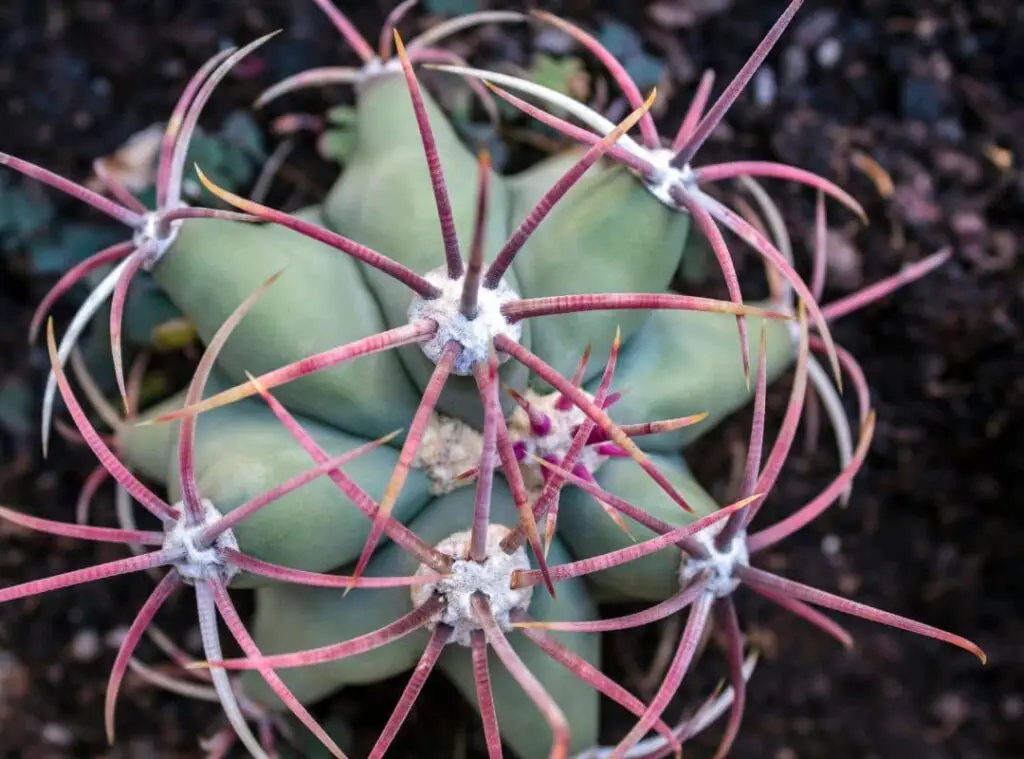
07. Ferocactus gracilis
Ferocactus gracilis are also hailing from Mexico. They are an exceptionally attractive set of plants. The stem of these plants would be deep green in color. Moreover, they would tend to look globular in shape which would tend to become cylindrical as they grow further.
Further Ferocactus gracilis may also consist of 16-24 ribs as well. They would be slightly tuberculate. The areoles would be oval to elliptic. Further those areolas would be 15-20 mm in length too.
Ferocactus gracilis would consist of both radial spines and central spines as well. The central spine would be reddish in color and they may also form with yellow tips as well. The spines would be curved , twisted o. Further they may tend to take even a tangled shape.
On the other hand , the radial spines would be slender , flattened and grow in a straight manner. Last but not least, Ferocactus gracilis flowers would tend to take a funnel shape. Those flowers would be either golden yellow or reddish.
Moreover in terms of the sizes of the flowers they would be about 4 cm long and 2,5 cm wide. They would flower in late spring or in early summer. Lastly they produce a yellow oblong shaped fruit item too.
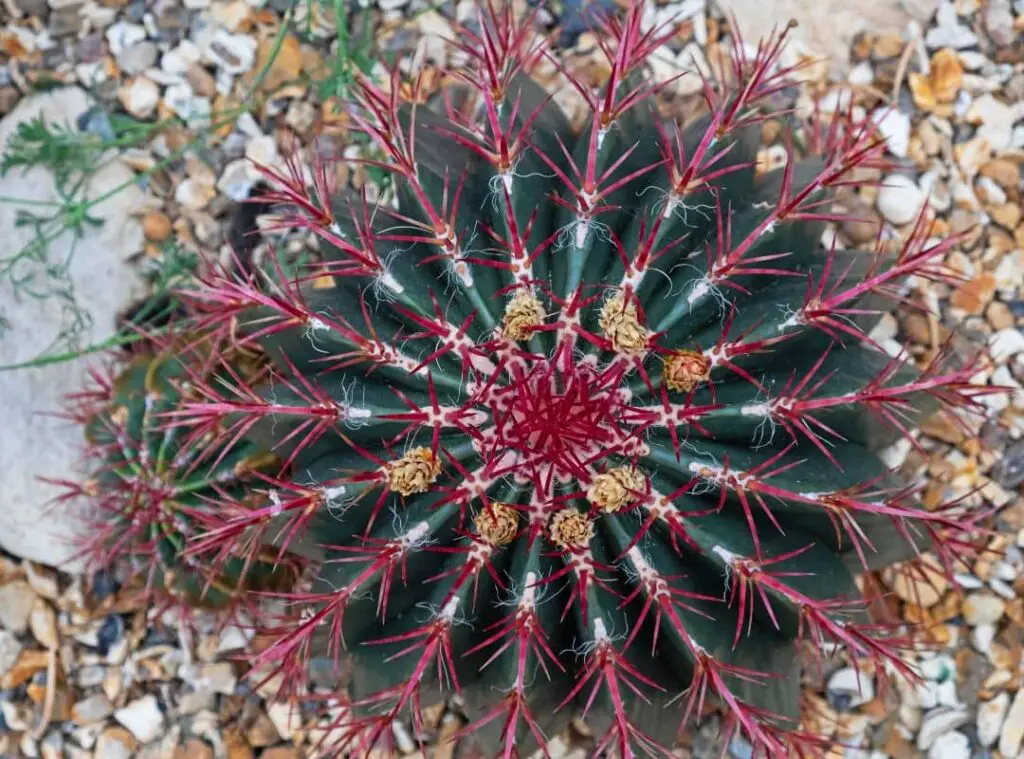
08. Ferocactus emoryi
Ferocactus emoryi plants are also native to Mexico just like most of the other pink cactus explained in the above. They would grow as solitary plants. Further they may tend to take a barrel shape as well. Ferocactus emoryi plants would form their stems in an erect manner.
Further Ferocactus emoryi plants would also tend to take a globular shape at the beginning of their growth. However, they would tend to take a cylindrical shape as they grow older.
These plants may also consist of shallowly notched (15-)21-32 ribs. The areoles would be oval shaped. Furthermore, they may also consist of 6-10 spines per areolas too. The spines would be reddish or reddish gray.
They would consist of 1 central spine which would tend to take a curved shape. Further they may also come up with 5-9 radial spines as well. These plants would bloom with reddish colored flowers.. Further, occasionally they may also form in yellow too. Lastly, they would come up with an oblong shaped yellow fruit too.
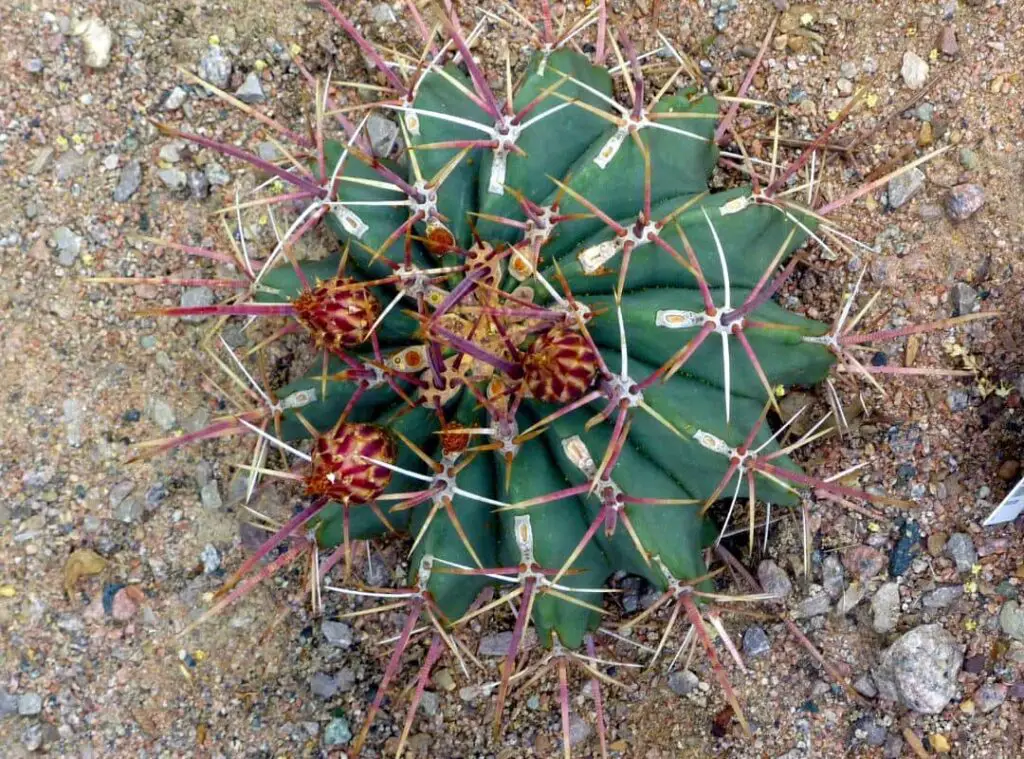
09. Ferocactus peninsulae
Ferocactus peninsulae are hailing from the USA and from Mexico as well. Ferocactus peninsulae are yet another barrel shaped cactus which would tend to take a cylindrical shape as they grow older. Chances are that they may reach a maximum height of 2.5 m which is somewhat in contrast with the rest of other plants in the genus.
The Ferocactus peninsulae stem would form in an erect manner and they may tend to take either a spherical or an ovoid shape. Ferocactus peninsulae would further comprise s10-12 acute ribs too.
The areoles would be circular and brown. They may consist of about 4 central spines, and you could spot them in red along with yellow tips. Furthermore, there will be 6-13 radial spines as well. You could spot them either in brown or white in color.
Ferocactus peninsulae blooms would be funnel shaped and about 5-6 cm in length. They would also be red to yellow in color. Occasionally you can spot them with orange to red mid veins as well. Spring to Autumn would be their flowering seasons. Lastly, they would produce a yellow globose shaped fruit item too.
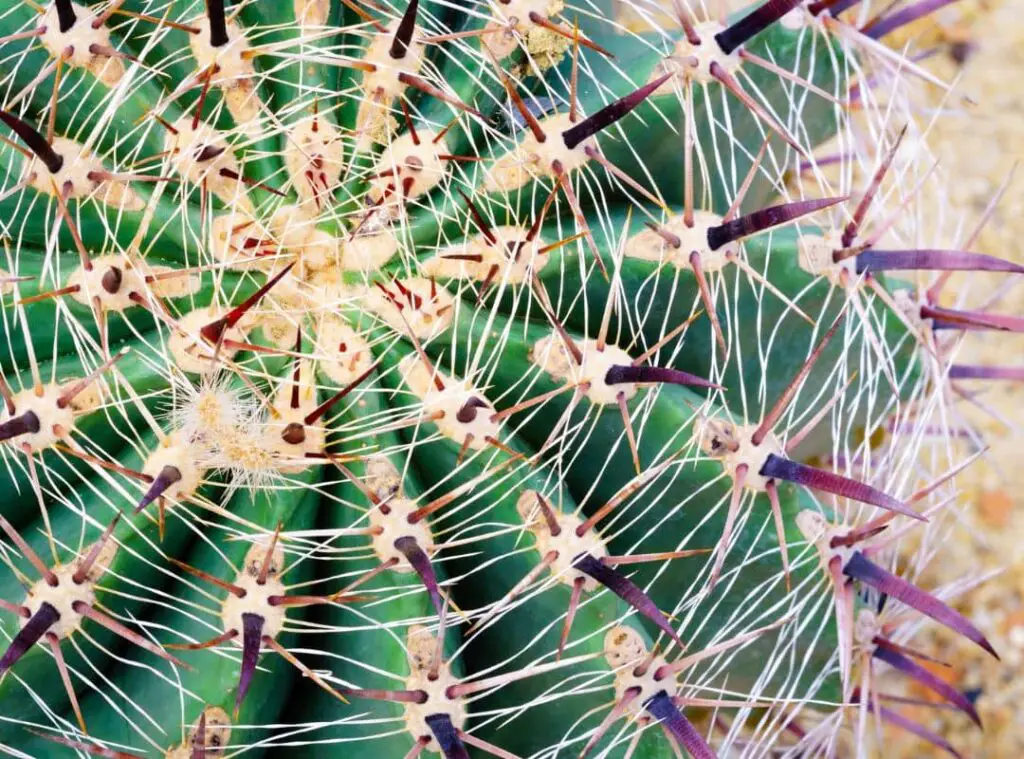
10. Ferocactus stainesii
Ferocactus stainesii are endemic to Mexico. Ferocactus stainesii plants are barrel shaped columnar cactuses which may develop with red spines. Ferocactus stainesii stems would be deep green in color and they would reach a maximum height of 2.4(-3) m.
Further they would be 30 t0 40 cm broad too. You could spot them carrying 13-20 ribs and they would form in a compressed manner.
The radial spines of the Ferocactus stainesii plants would be long and white. Furthermore there could be several central spines which would be either straight or slightly curved. At the start those spines would be more red in color. As they mature, they become dull yellow in color.
Finally , Ferocactus stainesii may emerge with yellow to red flowers as well. They would be 2,5 cm in length. Further they may tend to take an orbicular shape as well. Moreover Ferocactus stainesii develop a yellow fruit just like the other Ferocactus species mentioned above.
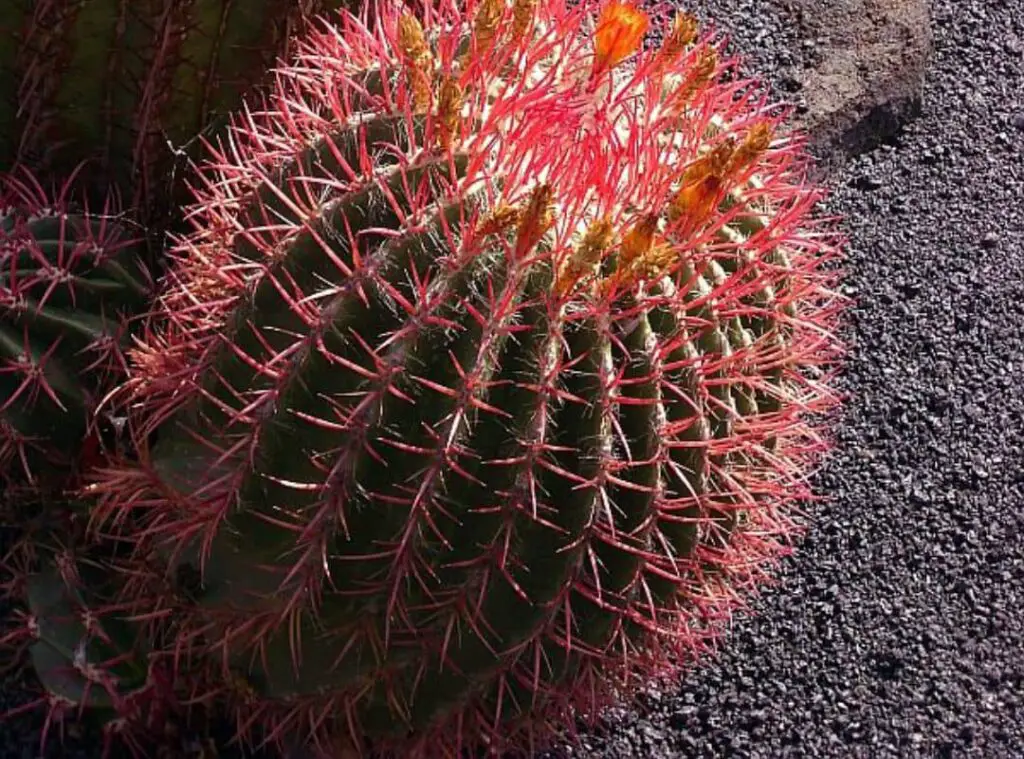
11. Ferocactus viridescens
Ferocactus viridescens plants are also endemic to Mexico and to the USA as well. They also grow as solitary barrel shaped cacti. The stem would be pale green to deep green in color. Moreover they would be somewhat glossy too. The stem would tend to take a globose shape.
Ferocactus viridescens plants would reach a maximum height of 0-30(-45)cm and a maximum width of 10-20(-35) cm .
Ferocactus viridescens plants come up with 13-21 ribs which would be about 1-2 cm tall. Those ribs would be round or obtuse. On the other hand, Ferocactus viridescens plants may comprise narrow to oval areolas as well. These areoles would be 10-20 mm in length. In addition to that these plants may also comprise 10-19 spines per areole.
You could spot the radial and the central spines in pink. However as they grow, they would tend to become yellow. There will be about 4 central spines and about 10-20 radial spines. Last but not least, you could spot them flowering with greenish yellow flowers along with some stripes in pink in spring or in early summer.
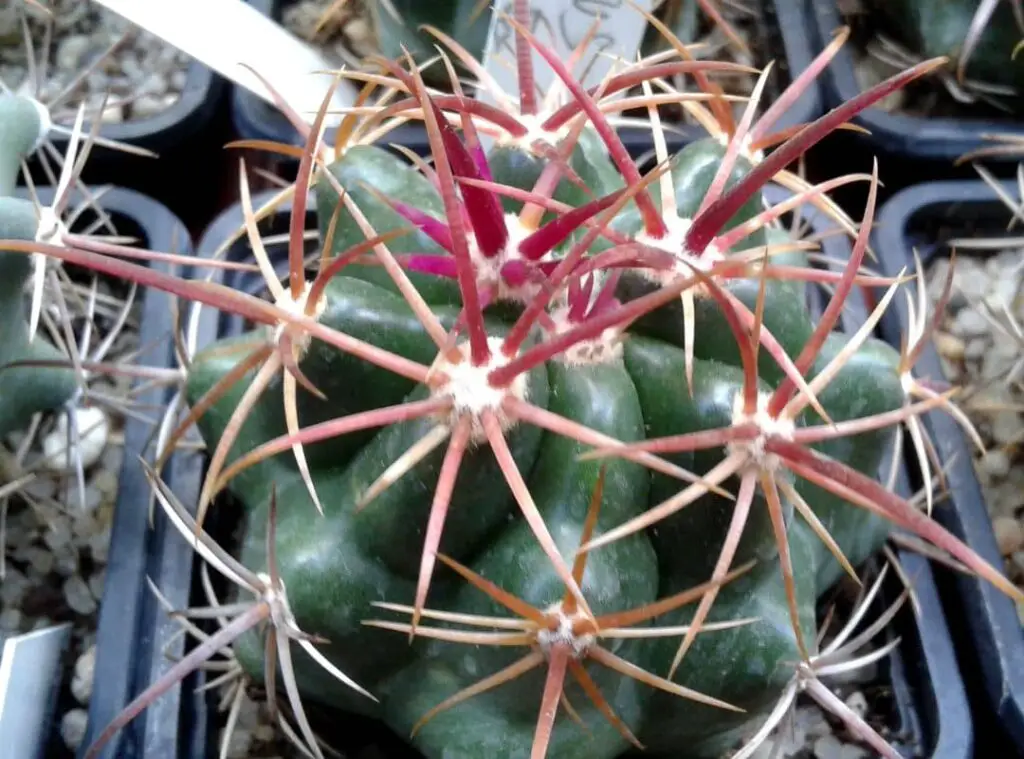
12. Echinocactus polycephalu (Cotton top cactus)
Cotton top cactus is scientifically known as Echinocactus polycephalu. They are a cross between Hedgehog Cactus and a Barrel Cactus. The stems of the Cotton top cactus would be barrel shaped and they would usually tend to grow in clumps. They would grow up to 12 inches in diameter. Further they would be about 15 inches tall as well.
They may also consist of ribs. Furthermore, their stems would be covered with long stout flattened spines as well. You could spot them flowering right on top of the stems. Moreover they would develop a fruit item which would also be covered with soft wooly hairs.
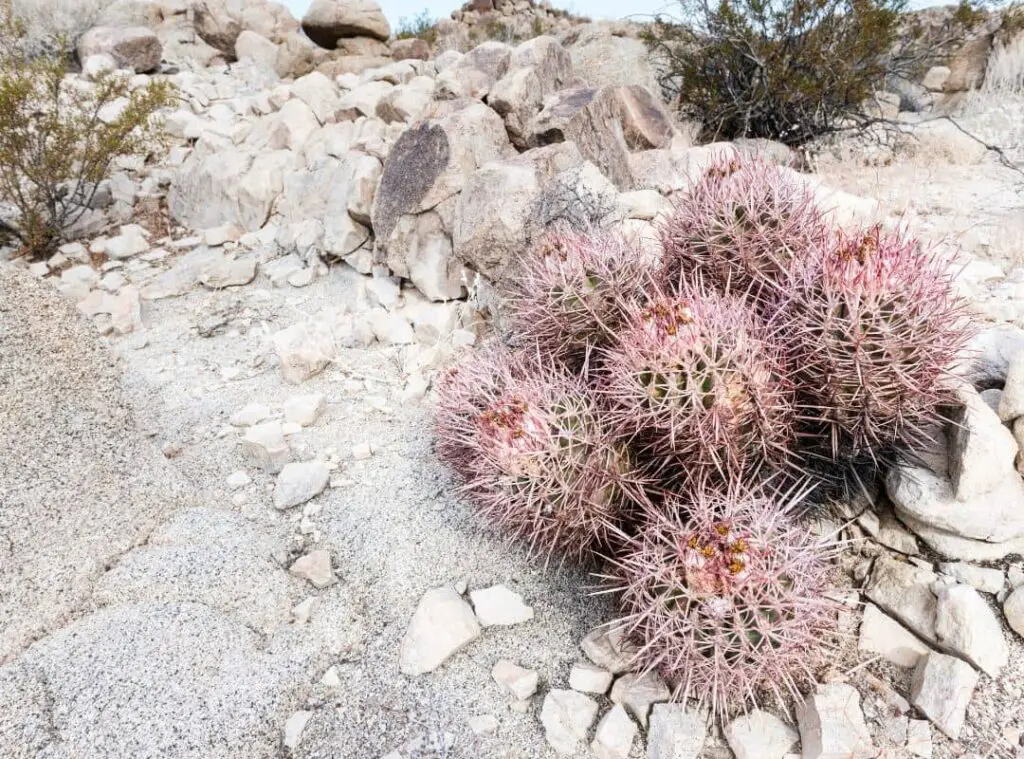
Read Next : 19 Most Beautiful Cylindropuntia Varieties That You Should Know
